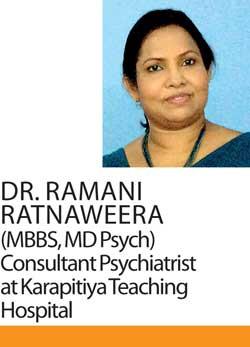13 Dec 2019 - {{hitsCtrl.values.hits}}

 Every time you ask your child to stay up late studying, you are inherently asking her to fight against his or her own biological design. Every time your child stares at his or her phone late in the night, he is endangering his psychological wellbeing.
Every time you ask your child to stay up late studying, you are inherently asking her to fight against his or her own biological design. Every time your child stares at his or her phone late in the night, he is endangering his psychological wellbeing.
Children are the future of everything we create. It is important that they grow up to be healthy individuals with a beautiful mind. Studies show that children, especially teenagers, are not getting their much required hours of sleep as recommended by doctors. Recognising this as a major issue that needs attention, the Daily Mirror Mirror Health Capsule spoke to Dr. Ramani Ratnaweera (MBBS, MD Psych) Consultant Psychiatrist at Karapitiya Teaching hospital who shed light on why sleep is important for children.
Lack of sleep is a major issue. Children don’t sleep at all at night and the next day they go for tuition and sleep. Or they go to school and sleep. Some children can’t even wake up in the morning to go to school
Food for the brain
Sleep is food for our brain. According to Dr. Ratnaweera, sleep is vital for your mental and physical well-being and for overall health. During sleep, your body cells, especially brain cells, are being repaired and regenerated and there are deep neural and hormonal connections functioning within the body.

“Though it’s a very much neglected component of our life, we do not give much prominence or much priority to our sleep. But sleep enables our body to repair and be fit day by day and we get ready for the next day by getting a very good sleep,” Dr. Ratnaweera commented.
Even though sleep should be an essential component of our lives as Dr. Ratnaweera emphasised, people are generally sleep deprived.
“According to the statistics, one out of three adults is sleep deprived. This is a big percentage of the population that does not give due importance to sleep,” she said. Studies show that many adolescents exhibit symptoms of a depressive mood on a frequent if not daily basis, and these teens are more likely to have sleep problems. As such, the percentage of sleep deprived teenagers is still gradually increasing.
Sleep healthy
One way or another, we all sleep. The question is do we sleep healthy?
According to Dr. Ratnaweera generally adults need about six to seven hours of sleep while children need about eight hours of sleep. “This sleep should be continuous and must be during the night time, not during day time. For a healthy sleep one should use a comfortable room at a comfortable temperature. In addition, one should avoid large meals, excessive consumption of coffee, tea and alcohol before sleep at night. Moreover, being active during the day time would be extremely beneficial for a good sleep. People should go to bed and get up from bed at a particular time and this should be practised throughout the week, even during weekends,” she said.
Understanding the circadian rhythm
Have you ever wondered why we rise and sleep with the sun? It is because we are biologically designed to do so. Sleep normally occurs in a circadian rhythm. We sleep in a 24 hour cycle. A circadian rhythm is a natural, internal system that’s designed to regulate sleepiness and wakefulness over a 24-hour period. This complex timekeeper is controlled by an area of the brain that responds to light. Therefore, it is important that we sleep at night and wake up in the morning.
Exam stress and sleep
In today’s society, there is so much pressure for a child to stay up late and study for exams. This is especially true for Advanced Level (A/L) students where they are told by teachers, parents and peers that merely four hours of sleep is enough.
But Dr. Ratnaweera strongly disagrees with this. “A six-hour sleep is a must for a child who is studying. Even for an A/L student, I would never recommend four hours sleep,” she said. She said she had seen children anxious and depressed after sleeping four hours a day, especially closer to exams, due to long term lack of sleep.
“Lack of sleep is a major issue. Children don’t sleep at all at night and the next day they go for tuition and sleep. Or they go to school and sleep. Some children can’t even wake up in the morning to go to school,” Dr. Ratnaweera voiced.
Understanding the difficulties faced by these children due to these extremely competitive exams, Dr. Ratnaweera said this does not necessarily mean that one should abandon sleep. Accordingly, children should stay awake and study as much as possible during day time and sleep peacefully during night time, managing their time efficiently.
“Studying is such that you should not be cramming without rest or sleep for a whole night. They start studying just two weeks before the exam. It’s very wrong. For long term memory children should study daily in a methodical way while taking periodic breaks,” Dr. Ratnaweera commented.
Can’t fall asleep
On the day before exams, we can’t fall asleep peacefully. This is due to exam stress. According to Dr. Ratnaweera, exam stress is very common among children nowadays
“Some children study a lot, but they still lack confidence. Some children are very pessimistic. Some children haven’t done their work and they are scared and are stressed,” she mentioned.
Her advice towards these children is to study methodically with proper time management while engaging in relaxation activities such as meditating and listening to music or playing a musical instrument. She believes the use of better study methods would boost their confidence. In her opinion children should not overstress themselves by going to too many tuition classes or by continuously studying for long hours.
If your child displays characteristics of a worse condition than exam stress, then he or she may be suffering from insomnia.
Insomnia is a sleep disorder in which people have difficulty in falling asleep or staying asleep as long as desired. According to Dr. Ratnaweera children with insomnia should engage in relaxation activities and participate in therapy sessions. “Medication should be the last resort,” she added.
Look up from your phone
Children, especially teenagers sleep during the day while being wide awake at night. This is very unhealthy and may lead to reduced productivity, anxiety, depression and insomnia. To address this issue widely we must look into the relationship between sleep and electronic media.
Dr. Ratnaweera believes that electronic media was an essential step towards development of mankind. But at present, these devices do more harm than good. In her belief usage of electronic media for academic use is fine but there is so much non-academic use of them such as social media, internet games, etc. Integrating these devices to your lifestyle in such a harmful manner is unhealthy.
Benefits of a healthy sleep
After a healthy sleep at night, your child would have a well-rested brain that is fully energised to carry out her studies with improved levels of concentration. This would result in remarkable academic performance during school.
The left part of the brain helps with studies where mathematical operations and other memory functions are handled. The right part of the brain is responsible for creative and artistic aspects of a child’s life. During sleep both left and right parts of the brain are resting and improving which enables a child to show excellent performance in studies as well as other extra-curricular activities.
Moreover, Dr. Ratnaweera mentioned that a good sleep results in better calorie regulation. In addition, sleep promotes better social and emotional intelligence.
“Furthermore, good sleep makes our immune system stronger and we obtain a better ability to fight our illnesses,” she commented.
Harms of sleep deprivation
Sleep deprivation is a condition where an individual gets less sleep than he or she need to feel awake and alert. It limits your child’s ability to learn, listen, concentrate and solve problems. They may even forget important information like names, numbers, their homework, etc. It may lead to aggressive or inappropriate behaviour. Sleepiness also impairs judgment. Making decisions is more difficult because you can’t assess situations as well and pick the right behaviour. Furthermore it may cause eating disorders
In addition, Dr. Ratnaweera emphasized that sleep deprivation makes your child more prone to chronic diseases such as diabetes, endocrine diseases, obesity and cardiovascular diseases. It’s also linked with anxiety, depression and other neurotic diseases and even skin problems.
21 Dec 2024 21 Dec 2024
21 Dec 2024 21 Dec 2024
21 Dec 2024 21 Dec 2024
21 Dec 2024 21 Dec 2024
21 Dec 2024 21 Dec 2024